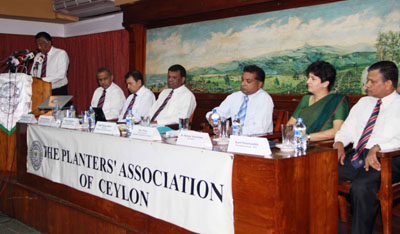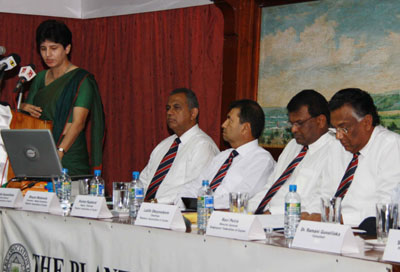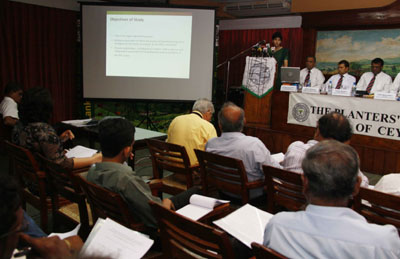Address by Mr Lalith Obeyesekere at the Planters' Association of Ceylon Media Conference on
July 12, 2011 at the Sri Lanka Tea Board Auditorium
 On behalf of the Planters' Association of Ceylon and the Employers’ Federation of Ceylon Plantation Services Group I wish to thank you for being here today at this press conference. On behalf of the Planters' Association of Ceylon and the Employers’ Federation of Ceylon Plantation Services Group I wish to thank you for being here today at this press conference.
As you know, the plantation industry is one of the oldest industries in this country which has, over the years, been the lifeblood of our economy. Unfortunately, I must say that it has also been quite vulnerable and has been the target of attack by organizations, and very often by people who were unaware of what is actually happening in the industry. Today, this press conference is mainly focusing on the Wage Collective Agreement and the revised wages granted under that Agreement and the sustainability of the industry in the future.
Firstly, I wish to very clearly say that the revision of wages during the period of privatization and the benefits that have accrued to the plantation workers since privatization have been very much more than the period during which the industry was nationalized. At the time the industry was privatized in 1992, the consolidated wage was Rs 60/88. Soon after privatization (within months) the package was increased to Rs 72/24 in October 1992.
The first Collective Agreement was signed in 1998 and through this Agreement the wage package was revised to Rs 101/- consisting of a basic wage of Rs 95/- plus a PSS of Rs 6/-. Today, the wage package is Rs 515/- with a basic wage of Rs 380/-, an Attendance Incentive of Rs 105/- and a PSS of Rs 30/-. The increase therefore during this period is approximately 500%. I can very well say with a sense of responsibility that there cannot be any industry which can boast of an increase in a wage package of this magnitude, during the period under consideration.
The percentage wage increase that was granted under the current Agreement vis-a-vis the wage package of Rs 405/-, is 27.1%. This is phenomenal, when compared with the wage increases given in other industries. I am advised that even in the Banking sector, the percentage increases granted under the Collective Agreements are not as high as one that has been granted under this Agreement.
 You are aware that there have been many articles, reports, press releases in the recent past, especially during the time of negotiations, which have projected the plantation workers as living in “poverty” and that the employment benefits granted to these workers are not adequate. If this is true, it is an indictment on all Plantation Trade Unions. “Poverty” is a very casual word that is often referred to by many who have not stopped to think as to what it means. “Poverty” cannot be directly linked to the income a person receives. It depends on many factors. Although I do not profess to be an economist, purely from a layman’s point of view I firmly believe that the manner in which a person spends money is often linked to the question of “poverty”. Therefore, the “poverty” tag which has been very often used on the plantation worker is a misconception as there are many other social factors and problems associated with this issue. You are aware that there have been many articles, reports, press releases in the recent past, especially during the time of negotiations, which have projected the plantation workers as living in “poverty” and that the employment benefits granted to these workers are not adequate. If this is true, it is an indictment on all Plantation Trade Unions. “Poverty” is a very casual word that is often referred to by many who have not stopped to think as to what it means. “Poverty” cannot be directly linked to the income a person receives. It depends on many factors. Although I do not profess to be an economist, purely from a layman’s point of view I firmly believe that the manner in which a person spends money is often linked to the question of “poverty”. Therefore, the “poverty” tag which has been very often used on the plantation worker is a misconception as there are many other social factors and problems associated with this issue.
Quite apart from this, I am proud to say that the plantation worker today receives a basic wage with provident fund and trust fund contributions of Rs 9,500/- per month. This is Rs 2,000/- more than the current minimum wage stipulated under the Wages Boards in respect of most trades. In addition, the total wage package of Rs 515/- guarantees a monthly package of Rs 12,875/-. In other words, if an employee attends work for more than 75% of the days offered, he is assured of the full wage package of Rs 515/- per day.
The impact of the wage package on the industry is substantial. Every Rupee increase inclusive of EPF, ETF and gratuity topping up has an impact of Rs 85.9 Million in respect of both tea and rubber sectors. This has increased the cost of production between Rs 30 – 50 per kilo for the Plantation Companies.
 The Regional Plantation Companies, through the EFC, undertook a study on the sustainability of the industry prior to the wage negotiations. This study was on “The long term profitability and productivity of Sri Lanka’s Regional Plantation Companies tea and rubber sectors”. This was done by Dr Ramani Gunatilleke who is also here today. She is a well known Economist and an independent consultant. One of the crucial elements that she has highlighted in the study is the positive co- relation between profitability and productivity. Her report very clearly states that increase in productivity is fundamental to increase profitability in the Regional Plantation Companies and that the losses experienced by the High Grown, Mid Grown and Uva sectors are due to the sectors’ inability to increase productivity sufficiently to offset high costs relative to those of competitors. The Regional Plantation Companies, through the EFC, undertook a study on the sustainability of the industry prior to the wage negotiations. This study was on “The long term profitability and productivity of Sri Lanka’s Regional Plantation Companies tea and rubber sectors”. This was done by Dr Ramani Gunatilleke who is also here today. She is a well known Economist and an independent consultant. One of the crucial elements that she has highlighted in the study is the positive co- relation between profitability and productivity. Her report very clearly states that increase in productivity is fundamental to increase profitability in the Regional Plantation Companies and that the losses experienced by the High Grown, Mid Grown and Uva sectors are due to the sectors’ inability to increase productivity sufficiently to offset high costs relative to those of competitors.
Therefore, what I need to emphasize here is that unless the Trade Unions and workers cooperate and assist the Companies in increasing productivity, the Regional Plantation Companies will not be able to sustain the wage increase that has been granted under the Agreement. It is unfortunate that the Trade Unions rejected alternative options that the Companies proposed with regard to a productivity based wage during this year’s negotiations. However, we hope that the Trade Unions will advise their membership to clearly bear in mind that unless productivity is increased, the Plantation Companies will not be able to withstand the pressures of the wage increase.
 I would also like to draw some comparison between Sri Lanka and other tea producing countries, namely, Kenya, China, India and Indonesia. New producers like Malawi, Turkey and Vietnam are also fast moving into the market. Among all these countries the highest productivity has been achieved in Kenya where some estates have achieved 3,500 kilos per hectare. In Sri Lanka, the highest achieved is 2,500 kilos per hectare. Our tea is already out-priced in the world market as the Global World Auction average in 2007 was only US$ 1.88 while the average at the Colombo auctions was US$ 2.88. This is a very serious situation as the cost of production is lower in countries we are competing with such as India and Kenya. In the 1960s and 1970s, Sri Lanka supplied more than one third of the tea in the world market. Today, it is less than one fifth. The plantation industry is Sri Lanka’s biggest employer with close to one million residents and over 250,000 workers. If the industry collapses, the socio economic consequences would be disastrous. It is therefore imperative to appreciate and understand the serious implications of increases in wages which consequently increase cost of production and poses a challenge to the survival of the industry. I would also like to draw some comparison between Sri Lanka and other tea producing countries, namely, Kenya, China, India and Indonesia. New producers like Malawi, Turkey and Vietnam are also fast moving into the market. Among all these countries the highest productivity has been achieved in Kenya where some estates have achieved 3,500 kilos per hectare. In Sri Lanka, the highest achieved is 2,500 kilos per hectare. Our tea is already out-priced in the world market as the Global World Auction average in 2007 was only US$ 1.88 while the average at the Colombo auctions was US$ 2.88. This is a very serious situation as the cost of production is lower in countries we are competing with such as India and Kenya. In the 1960s and 1970s, Sri Lanka supplied more than one third of the tea in the world market. Today, it is less than one fifth. The plantation industry is Sri Lanka’s biggest employer with close to one million residents and over 250,000 workers. If the industry collapses, the socio economic consequences would be disastrous. It is therefore imperative to appreciate and understand the serious implications of increases in wages which consequently increase cost of production and poses a challenge to the survival of the industry.
Safeguarding the industry, which has been one of the major foreign exchange earners over the years is not only a responsibility of the Regional Plantation Companies. It is the responsibility of every Sri Lankan citizen who is genuinely interested in safeguarding this industry and the plantation community. Therefore, it is time that the government, trade unions, workers, NGOs and the Regional Plantation Companies, get together and do everything possible within their control to ensure that this industry will survive and remain for our future generations.
|